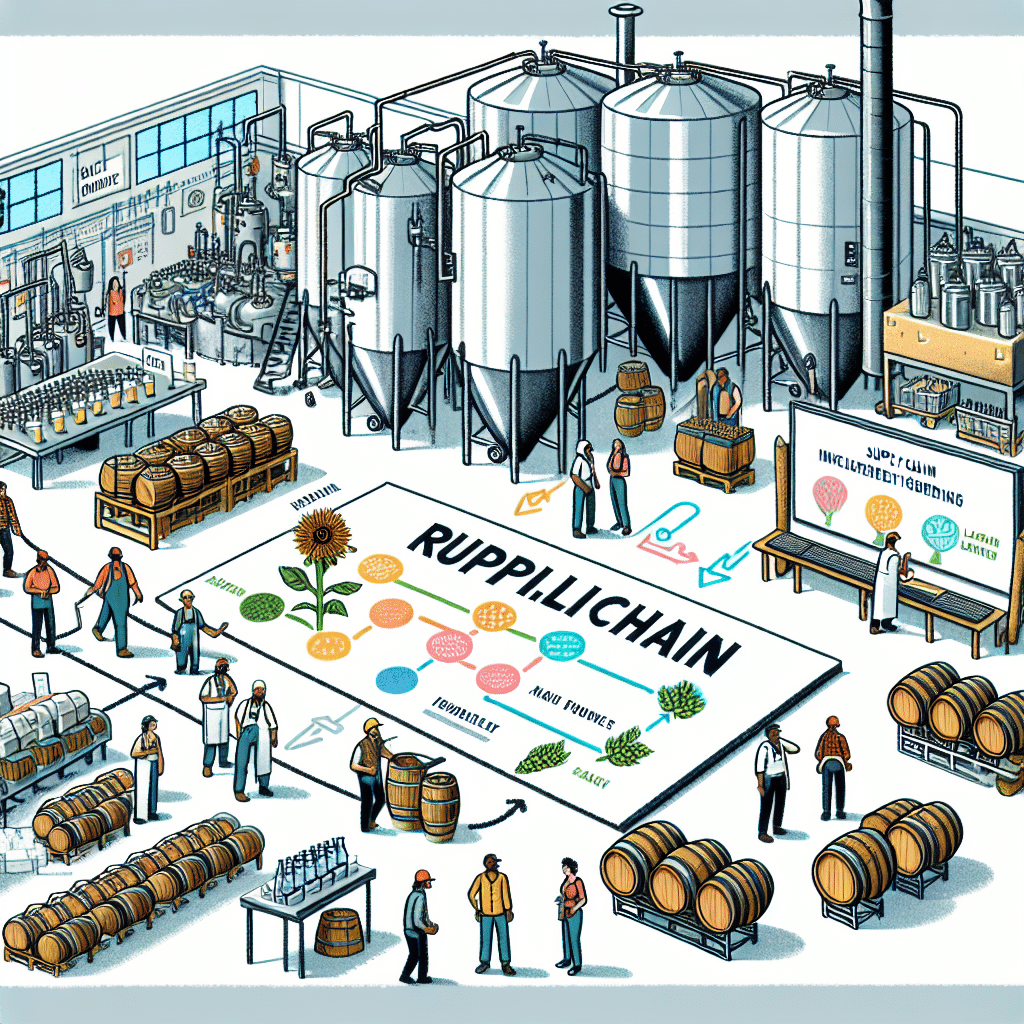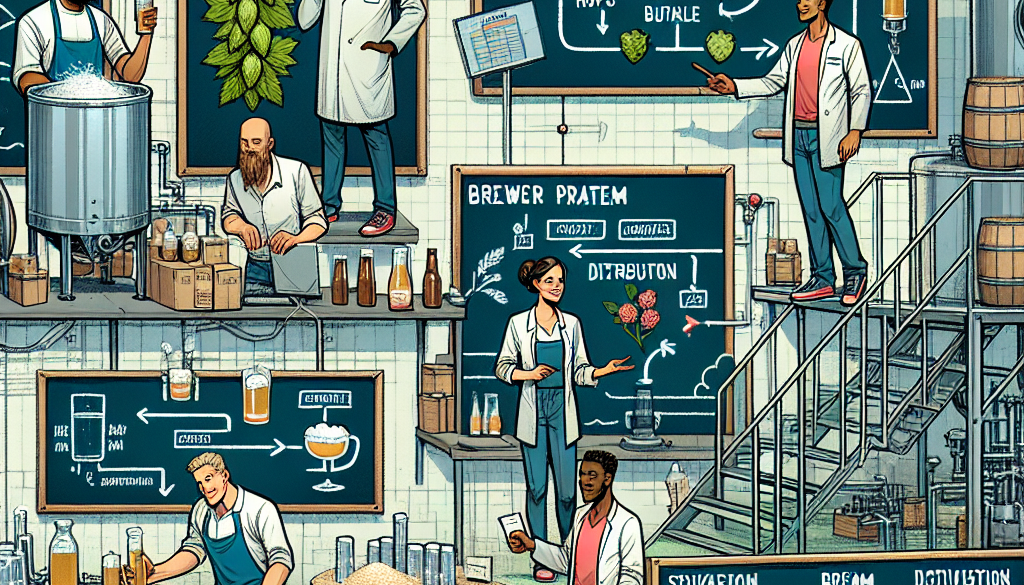Supply Chain Resilience in Craft Breweries
-
Table of Contents
- Supply Chain Resilience in Craft Breweries: Strategies for Success
- Understanding Supply Chain Vulnerabilities
- Building a Resilient Supply Chain
- 1. Diversifying Suppliers
- 2. Investing in Quality Control
- 3. Embracing Technology
- 4. Strengthening Relationships with Local Producers
- 5. Flexible Production Planning
- 6. Maintaining Safety Stock
- 7. Exploring Alternative Transportation Methods
- Case Studies and Statistics
- Conclusion: The Path to Resilience
- Enhance Your Craft Brewery with ETprotein’s High-Quality Protein Products
Supply Chain Resilience in Craft Breweries: Strategies for Success

The craft beer industry has seen a meteoric rise in popularity over the past decade, with small-scale breweries popping up in cities and towns around the world. However, the success of these businesses is heavily reliant on their supply chains, which can be vulnerable to a variety of disruptions. From raw material shortages to transportation delays, craft breweries must navigate a complex network of challenges to ensure their product reaches consumers. This article explores the importance of supply chain resilience in craft breweries and offers strategies to help these businesses thrive in a competitive market.
Understanding Supply Chain Vulnerabilities
Before delving into resilience strategies, it’s crucial to understand the vulnerabilities that craft breweries face. Some of the most common challenges include:
- Dependency on specialized ingredients that may have limited suppliers
- Fluctuations in the quality and availability of raw materials like hops and barley
- Transportation disruptions caused by weather, political unrest, or infrastructure issues
- Changing regulatory environments that can impact import/export processes
- Market demand variability, which can lead to overproduction or stockouts
These vulnerabilities can have significant impacts on production, cost, and ultimately, the consumer experience.
Building a Resilient Supply Chain
To mitigate these risks, craft breweries must focus on building resilience into their supply chains. The following strategies are essential:
1. Diversifying Suppliers
Reliance on a single supplier for key ingredients can be risky. Breweries should seek to establish relationships with multiple suppliers to avoid disruptions. This diversification can also lead to competitive pricing and improved quality through supplier competition.
2. Investing in Quality Control
Ensuring consistent quality of raw materials is vital. Breweries can invest in in-house laboratories or partner with third-party labs to test ingredient quality. This proactive approach can prevent costly recalls and maintain brand reputation.
3. Embracing Technology
Advanced technologies like supply chain management software can provide real-time visibility into inventory levels, shipment tracking, and demand forecasting. This information allows breweries to make informed decisions quickly.
4. Strengthening Relationships with Local Producers
Forming partnerships with local farmers and producers can reduce transportation risks and support the local economy. It also allows breweries to have more control over the quality and supply of raw materials.
5. Flexible Production Planning
Adopting a flexible approach to production planning can help breweries adjust to demand fluctuations and supply chain disruptions. This might include scaling production up or down or even temporarily altering product lines.
6. Maintaining Safety Stock
Keeping a buffer stock of critical ingredients can protect against short-term supply disruptions. However, this strategy requires careful management to avoid excess inventory that could lead to waste or financial strain.
7. Exploring Alternative Transportation Methods
Depending on a single mode of transportation can be a liability. Breweries should consider multiple transportation options, such as rail, trucking, or even air freight, to ensure their products reach the market.
Case Studies and Statistics
Several craft breweries have successfully navigated supply chain challenges. For instance, a brewery in Colorado diversified its hop suppliers across different regions, which allowed it to continue production despite a poor harvest in the Pacific Northwest. Another brewery in California implemented a sophisticated inventory management system that reduced waste by 20% and improved its response to market demand.
Statistics show that breweries with resilient supply chains can see significant benefits. According to a survey by the Brewers Association, breweries that invested in supply chain resilience reported a 15% higher customer satisfaction rate and a 10% increase in sales compared to those that did not.
Conclusion: The Path to Resilience
In conclusion, supply chain resilience is critical for the success of craft breweries. By diversifying suppliers, investing in quality control, embracing technology, strengthening local partnerships, planning production flexibly, maintaining safety stock, and exploring alternative transportation methods, breweries can build robust supply chains capable of withstanding various disruptions. These strategies not only protect the business but also ensure that consumers continue to enjoy their favorite craft beers without interruption.
Enhance Your Craft Brewery with ETprotein’s High-Quality Protein Products
For craft breweries looking to innovate and expand their product offerings, ETprotein’s range of high-quality protein products can be an excellent addition. Whether you’re developing a new line of protein-enriched beers or exploring non-alcoholic options, ETprotein’s organic and non-GMO proteins can help you meet the growing demand for health-conscious beverages. With a neutral taste and allergen-free attributes, these proteins are perfect for creating unique brews that stand out in the market.
About ETprotein:
ETprotein, a reputable protein and L-(+)-Ergothioneine (EGT) Chinese factory manufacturer and supplier, is renowned for producing, stocking, exporting, and delivering the highest quality organic bulk vegan proteins and L-(+)-Ergothioneine. They include Organic rice protein, clear rice protein, pea protein, clear pea protein, watermelon seed protein, pumpkin seed protein, sunflower seed protein, mung bean protein, peanut protein, and L-(+)-Ergothioneine EGT Pharmaceutical grade, L-(+)-Ergothioneine EGT food grade, L-(+)-Ergothioneine EGT cosmetic grade, L-(+)-Ergothioneine EGT reference grade and L-(+)-Ergothioneine EGT standard. Their offerings, characterized by a neutral taste, non-GMO, allergen-free attributes, with L-(+)-Ergothioneine purity over 98%, 99%, cater to a diverse range of industries. They serve nutraceutical, pharmaceutical, cosmeceutical, veterinary, as well as food and beverage finished product distributors, traders, and manufacturers across Europe, USA, Canada, Australia, Thailand, Japan, Korea, Brazil, and Chile, among others.
ETprotein specialization includes exporting and delivering tailor-made protein powder and finished nutritional supplements. Their extensive product range covers sectors like Food and Beverage, Sports Nutrition, Weight Management, Dietary Supplements, Health and Wellness Products, and Infant Formula, ensuring comprehensive solutions to meet all your protein needs.
As a trusted company by leading global food and beverage brands and Fortune 500 companies, ETprotein reinforces China’s reputation in the global arena. For more information or to sample their products, please contact them and email sales(at)ETprotein.com today.












